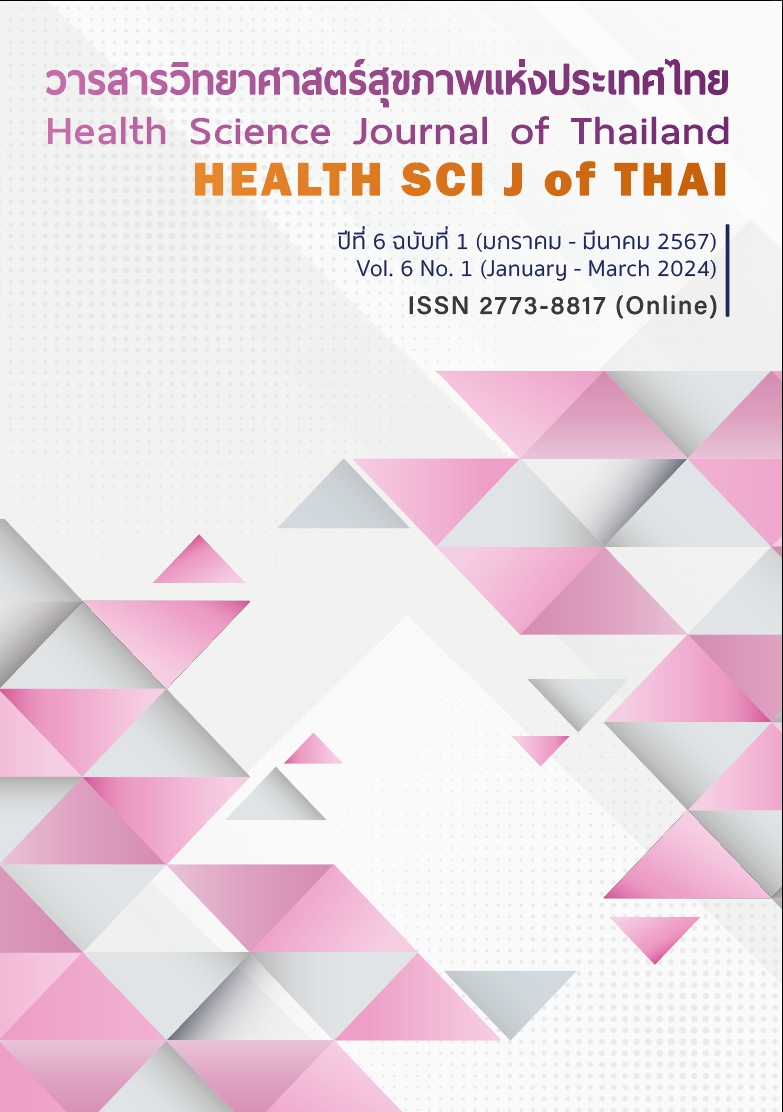Levels of Interest, Knowledge, and Awareness of Restaurant Operators and Community Enterprises on Legal Measures and Production Method of Cannabis-Containing Food
Main Article Content
Abstract
This research aimed to study levels of interest in producing cannabis-containing food products and assess the knowledge and awareness of entrepreneurs and community enterprises on legal issues and production processes. The target groups were food and beverage entrepreneurs and community enterprises in Chiang Mai, who were 18 years old and older and have been in business for at least one year. Data was collected by interviewing or online questionnaire between February and April 2022. The results showed that the sample group consisted of 192 food and beverage operators (60.00%), and 128 community enterprises (40.00%). The respondents (42.50%) were interested in producing cannabis-containing food and beverage products, and entrepreneurs were interested more than community enterprises (46.87% and 35.94%, respectively). When analyzing the relationship using the chi-square test, there were statistically significant correlations between gender, age, and type of entrepreneurship to the interest in cannabis-containing products (p-value<0.050). In the knowledge of production method, it was found that more than 50 percent of the subjects were unaware of precautions of using cannabis parts for cooking and unknown how to cook cannabis-containing foods properly. The sample group had a moderate and appropriate level of consumer safety awareness (59.13 and 39.13%). For the safety of consumers, the research team has suggested that the government sector must give clear safety measures for the business of cannabis-containing foods, and the post-marketing surveillance should be regularly performed.
Article Details

This work is licensed under a Creative Commons Attribution-NonCommercial-NoDerivatives 4.0 International License.
References
Ministry of Public Health. Notification of Ministry of Public Health: Specify the name of the narcotics category 5 B.E. 2563. Government Gazette No. 137 Special section 290 D. (dated December 14, 2020). (In Thai)
Ministry of Public Health. Notification of Ministry of Public Health No. 424 B.E. 2021, issued under the Food Act B.E. 2522: Prescribe food that is prohibited to be produced, imported or sold. Government Gazette No. 138 Special section 45 D. (dated February 25, 2021). (In Thai)
Ministry of Public Health. Notification of Ministry of Public Health: Specify the name of the narcotics category 5 B.E. 2565. Government Gazette No. 139 Special section 45 D. (dated February 9, 2022). (In Thai)
Manager Online. Unlocking Marijuana, hope for entrepreneurs and restaurants. [internet] 2021 [cited March 2, 2022]. Available from: https://mgronline.com/smes/detail/9640000016094. (In Thai)
Hfocus. Doctors warned that eating cannabis-containing food must be careful. [internet] 2021 [cited March 5, 2022]. Available from:
https://www.hfocus.org/content/2021/02/21097. (In Thai)
Boontae S. The survey of knowledge, understanding, and public opinion on medical marijuana use and recreational use, 2019: A case study of people aged 15 years and over, nationwide. Bangkok: Department of psychiatry, the faculty of Medicine, Chulalongkorn University, 2021. (In Thai)
Prachatai. The consumer organization warns the Thai FDA must carefully consider unlocking cannabis-containing food. [internet] 2021 [cited May 5, 2022]. Available from: https://prachatai.com/journal/2021/02/91787. (In Thai)
Komoltree J. Sample size estimation. Journal of Mental Health of Thailand 2012; 20(3): 192-8. (In Thai)
Silanoi L, Chindaprasert K. The Use of Rating Scale in Quantitative Research on Social Sciences, Humanities, Hotel and Tourism Study. Journal of Management Science, Ubon Ratchathani University 2019; 8(15):112-126. (In Thai)
Ministry of Public Health. Notification of Ministry of Public Health: Controlled herbal (Cannabis) B.E. 2565. Government Gazette No. 139 Special section 272 D. (dated November 23, 2022). (In Thai)
Ministry of Public Health. Notification of Ministry of Public Health No. 427 B.E. 2021, issued under the Food Act B.E. 2522: Food products that contain parts of cannabis or hemp. Government Gazette No. 138 Special section 168 D. (dated July 23, 2021). (In Thai)
Ministry of Public Health. Notification of Ministry of Public Health No. 438 B.E. 2022, issued under the Food Act B.E. 2522: Food products that contain parts of cannabis or hemp (No.2). Government Gazette No. 139 Special section 251 D. (dated October 21, 2022). (In Thai)
Ministry of Public Health. Notification of Ministry of Public Health: Criteria, methods, quality control and hygiene management of the distribution of ready-to-eat food in food places (No.2) B.E. 2565. Government Gazette No. 139 Special section 198 D. (dated August 25, 2022). (In Thai)
Thai Pediatrics. Position statement of the Royal College of Pediatricians of Thailand on the impact of liberalized marijuana laws on the health of children and adolescents. [internet] 2022 [cited July 25, 2022]. Available from: https://www.thaipediatrics.org/?p=1606. (In Thai)
Nutrition Association of Thailand. The statements of Nutrition Association of Thailand to concern about the consumption of cannabis-containing food. [internet] 2022 [cited July 25, 2022]. Available from: https://www.nutritionthailand.org/images/dataweb/news/108/(1)แถลงการณ์20220617_15455768.pdf (In Thai)
Thailand Consumers Council. Concerns to the Minister of Public Health in the case of cannabis unlocking and the dangerous of cannabis-containing food. [internet] 2022 [cited January 5, 2023]. Available from: https://www.tcc.or.th/cannabis-food/. (In Thai)


